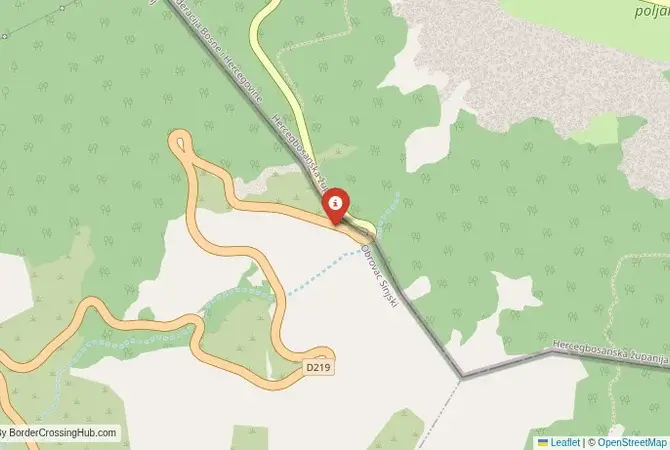
Approximate Border Location
Border Countries
Border Cities
- 🇭🇷Bili Brig
- 🇧🇦Vaganj
Wait Times
15-60 min for pedestrians/vehicles
Operating Hours
Open 6:00 AM – 10:00 PM
Crossing Types
Pedestrians, vehicles
Border Type
Land crossing via road
Peak Times
Mornings (7-10 AM)
Daily Crossings
~1500 travelers/vehicles
Currency Exchange
Limited near Vaganj (BAM, EUR)
Safety Information
Rural, minimal crime
Languages Spoken
Bosnian/Croatian
Accessibility Features
Ramps, assistance
About Bili Brig & Vaganj
A High-Altitude Crossing in a Karst Landscape
The border crossing at Vaganj, connecting the area near Livno in Bosnia and Herzegovina with Bili Brig in Croatia, is a journey through a spectacular and wild high-altitude landscape. This is a major international checkpoint, but its remote location on the vast Livanjsko Polje, the largest karst field in the world, gives it a unique character. Since Croatia is a member of the European Union and the Schengen Area, this is an external border. To cross here is to travel a route that has been a historic corridor between the Dalmatian coast and the Bosnian interior for centuries, a passage through a landscape of rugged mountains, wild horses, and a deep, often harsh, history.
Operational Details
This checkpoint connects the Canton 10 of Bosnia and Herzegovina with Croatia’s Split-Dalmatia County. It is a major international crossing, open 24/7 to both passenger cars and commercial freight. It is located on the main road that connects the Bosnian city of Livno with the Croatian city of Sinj and the major coastal city of Split. The facility is located at a high altitude on the Dinara mountain range, and it can be subject to harsh winter conditions, with heavy snow and strong winds (the famous “bura”).
Before Crossing
Crossing borders gets messy sometimes, think political flare-ups or gates shutting fast. Good travel insurance is a must for handling doctor visits, trip disruptions, or security scares. Don’t get caught unprepared. To find a policy that’s got your back, check out reliable plans today for peace of mind.
A History of a Highland Corridor
The history of this region is the history of the Dinaric Alps, a rugged land that has been a frontier between empires and cultures for centuries. The Livanjsko Polje has been an important area for livestock grazing since Illyrian times. The route over the Vaganj pass has been used by Roman legions, medieval traders, and Ottoman armies. During the Yugoslav era, this was an internal administrative line. The breakup of Yugoslavia and the Bosnian War turned it into an international border. The opening and modernization of this crossing has been crucial for the economy of the Livno region, which has strong ties to the Dalmatian coast.
The Schengen Border Procedure
The border crossing procedure is a rigorous process, reflecting its status as an entry point into the EU and the Schengen Area. You will first complete exit formalities at the Bosnian checkpoint. After a short drive, you will arrive at the Croatian checkpoint for a full EU/Schengen entry inspection by the Croatian Border Police and Customs. You will need a valid passport. National ID cards are only sufficient for EU citizens. Vehicle registration and international insurance (Green Card) are also necessary. As a Schengen entry point, the checks are very thorough. Queues can form, especially during the summer when traffic to the coast is heavy.
The Surrounding Region: Bosnia and Herzegovina Side
On the Bosnian side, the crossing is the gateway to the magnificent Livanjsko Polje. This vast plain is a unique karst ecosystem, a temporary lake in the winter and a vast pasture in the summer. It is most famous for being home to one of the last herds of wild horses in Europe. The city of Livno is the main cultural and economic center of the region, with a beautiful old town, a historic bridge, and the source of the Bistrica river. The region is the heartland of the Bosnian Croat community.
The Surrounding Region: Croatia Side
On the Croatian side, the crossing descends from the Dinara mountains into the Dalmatian hinterland. The nearby town of Sinj is famous for the “Sinjska Alka,” a spectacular equestrian tournament that has been held every year since 1715 to commemorate a victory over the Ottoman army. The tournament is inscribed on the UNESCO list of Intangible Cultural Heritage. The road from the border leads directly to the major coastal city of Split, with the magnificent Diocletian’s Palace, a UNESCO World Heritage site, and ferry connections to the beautiful Dalmatian islands.
Practical Travel Information
Practical planning is essential for this route. You must have a suitable vehicle and be prepared for mountain driving. Check the weather and road conditions before you set out, especially in winter. The official currencies are the Bosnian Convertible Mark (BAM) in Bosnia and Herzegovina and the Euro (EUR) in Croatia. Services at the border are limited. It is essential to plan for fuel and any currency exchange in the larger towns of Livno or Sinj. Ensure your vehicle’s Green Card insurance is valid for both countries.
Final Considerations
The Vaganj–Bili Brig border crossing is a journey through a landscape of raw, stunning beauty and a region with a deep and proud history. It is a vital link between the Bosnian interior and the Croatian coast. It offers a spectacular drive through one of the most unique karst landscapes in the world. For the traveler looking to explore the wild heart of the Dinaric Alps, from the wild horses of Livno to the historic tournaments of Sinj, it is an essential and unforgettable passage.
See other crossings between Bosnia and Herzegovina and Croatia
See other crossings between Bosnia and Herzegovina and Croatia
No reviews yet.
